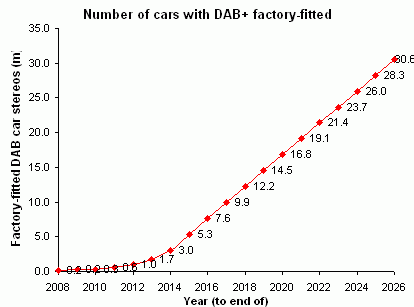This article is more than 1 year old
The great FM radio switch-off: Don't Panic!
The media's media dept got Carter completely wrong
This is something of a curse, given that making a DAB commitment costs money - whether you're choosing to beam into selected regions, or launch a national station on the DAB multiplex. In the case of the latter, that's a cool million quid a year on Arquiva. Combine that with low audiences, and you have a problem. At one nationwide DAB station, apparently, delivering the programmes costs more per-listener hour than prime time BBC 1 TV costs per-viewer hour.
(This is not, you'll have guessed, a commercial operator).
Last year the biggest commercial player Global decided it was bailing out of DAB, and the most interesting potential newcomer in years, a consortium led by Channel 4, decided it wasn't entering the market. C4 had planned 10 stations going up against the BBC. DAB carriage costs - and the low audience digital attracts - proved the clincher.
The termination threat merely cancels the automatic rollover renewal.
A voluntary digital switchover?
Now we've established that it's an aspiration, what are the chances of this wish coming true?
At this point we should note a slippery distinction familiar to observers of the radio business. DAB is not the only digital game in town. 37 per cent of digital listening isn't on a DAB set. There's internet radio, and any digital "switchover" doesn't necessary mean mandatory DAB. In fact, given the lack of financial support for DAB, IP-based radio is the big winner in the Carter report.
Let's have a look at the market penetration. Ofcom estimates there are 120 to 150 million analogue radios in the UK. Cumulative sales of DAB-capable sets, are 9 million, short of predictions, and growing by around 2m a year. Even accounting for DAB listening it's barely limped into the 20 per cent penetration range. Sales are flat-lining, and even fell in the 2008 Xmas shopping season, year-on-year.
DAB is absent from two vital areas, cars and mobile phones, and while Carter ignored mobile radio completely, he explicitly targeted car manufacturers. The government promises to "work with manufacturers so that vehicles sold with a radio are digitally enabled by the end of 2013".
This is a challenge. The DAB lobby's Digital Radio Development Bureau said yesterday that the majority of Ford cars are already available with DAB as an option. It's just not an option many people are choosing.
And here, Britain's strange insistence on maintaining its own flavour of digital radio deters manufacturers. The few other countries (including Denmark) to adopt DAB have already announced migration strategies to DAB+, or are about to. By 2013, we could be the only country left. This is not good considering economies of scale.
This illustrates the scale of the challenge:

There are 30m vehicles on the road - there's a long, long way to go.
But the biggest reason why the aspiration won't be met is right there in the Report: the 50 per cent trigger. Even if the magic number was met, neither the BBC, nor commercial broadcasters, would want half their audience to disappear overnight. Audience falls of 10 per cent are considered disastrous.
So what analogue switch-off?
As Goddard pointed out here at El Reg when the DRWG findings were published in December, that isn't going to happen, a point he re-emphasises today:
"Not in my lifetime," says Goddard, whose full analysis on Carter can be found here.
Carter's team gambled that the average media correspondent can speed read, but has an attention span no longer than a Twitter post - a good bet, as it turned out. ®
Andrew warmly welcomes your comments
